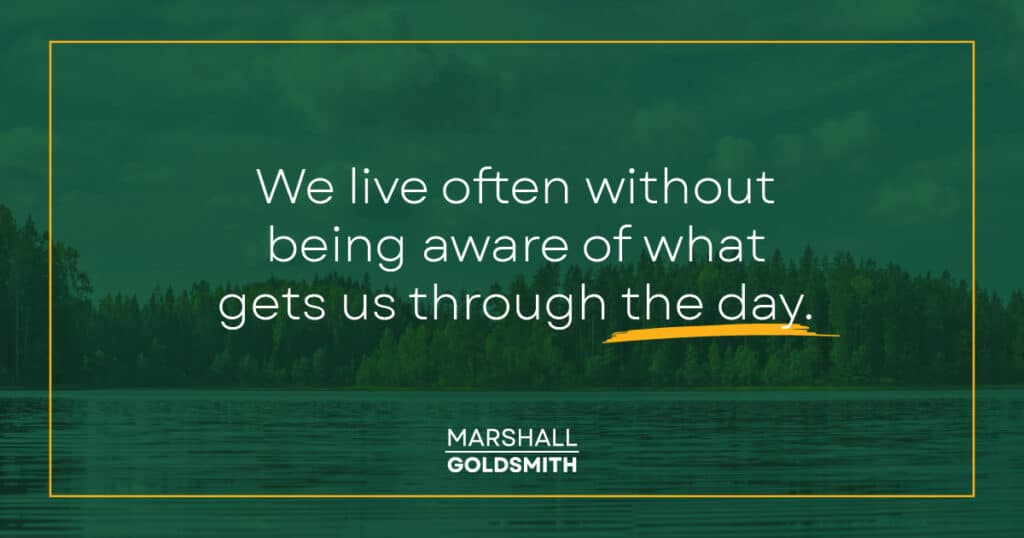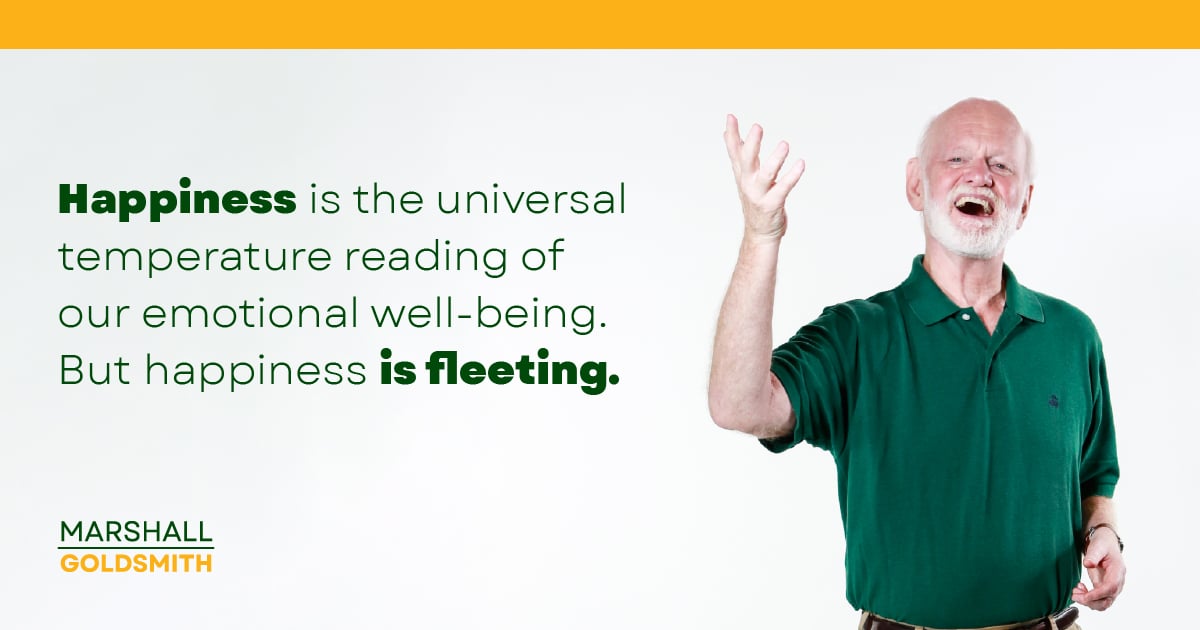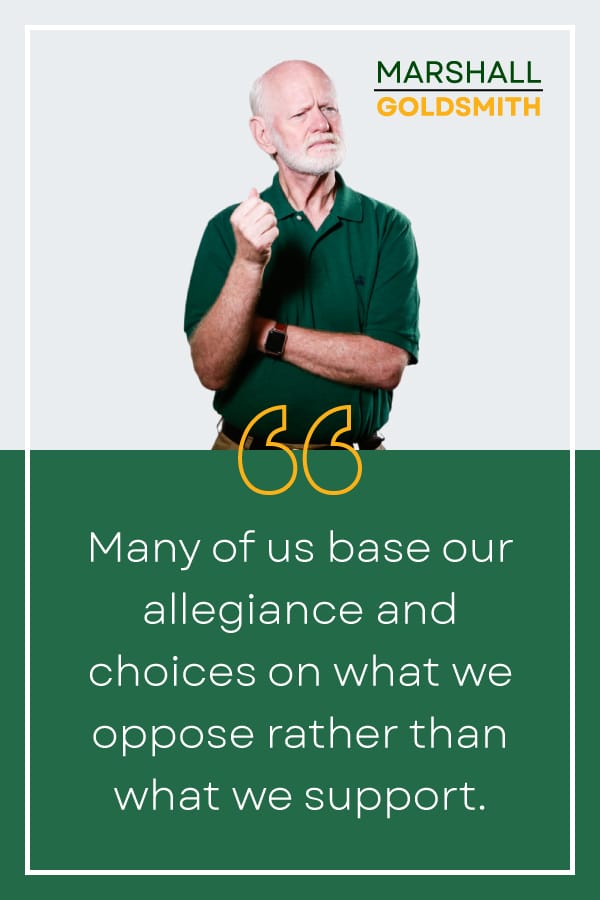Playing Favorites By Marshall Goldsmith There’s a reason I devote...
We are always weighing ourselves against our expectations.
Have we succeeded where we wanted? Have we failed?
Have we tried? Have we given it our all?
Have we made a difference?
Are we fulfilled? Are we unhappy with what our life has become?
Our lives toggle back and forth between two emotional polarities. At one pole is the emotion we know as fulfillment. We judge our internal sense of fulfillment against six factors that I call the Fulfillers:
These are the guideposts that dictate all our striving in life. (I’m not including health and wealth here, since they aren’t the subjects of regret or actual fulfillment for most people.)
We cannot recapture the seconds of every day, even as many people record their lives in Instagram moments and continual visual records of activities.
We live often without being aware of what gets us through the day. We invest enormous resources of time and energy to find purpose and meaning in our lives, to be recognized for our achievements, to maintain our relationships, to be engaged in whatever we do, and to be happy.

Our vigilance and striving here are unceasing, because our connection to these six factors is fragile, fickle, and fleeting.
Many wise people know this – but people just as wise tend to forget it as they go about their days. The 19th-century American writer-poet-philosopher Ralph Waldo Emerson put it this way:
“Write it on your heart that every day is the best day of the year. He is rich who owns the day, and no one owns the day who allows it to be invaded with fret and anxiety. You have done what you could. Some blunders and absurdities, no doubt, crept in. Forget them as soon as you can — tomorrow is a new day; begin it well and serenely with too high a spirit to be encumbered with your old nonsense. This new day is too dear, with its hopes and invitations, to waste a moment on yesterdays.”
Yet how many of us waste our moments on yesterdays!
We think we should have done something else. We regret our actions. But that is not the way to happiness.
Happiness is the universal temperature reading of our emotional well-being. This is why we frequently ask ourselves whether we’re happy. It’s why people ask us if we’re happy. But happiness is fleeting.
The great French writer Gustave Flaubert suggested that our true happiness lies in our expectation of being happy – rather than the thing itself. That’s because the actual event can never live up to our outsized expectations of it.
The thing is, happiness can be our least permanent emotional state, as brief as a dream. Our nose itches, we scratch it, we’re relieved and happy, and then we notice an annoying fly buzzing around the room and a chilly breeze gusting through the window, and somewhere a leaky faucet is dripping.
This goes on from moment to moment, all day long. Our happiness vanishes instantly and constantly. Meaning, purpose, engagement, relationships, and achievement are each equally vulnerable. We reach for them and grasp them, but with alarming rapidity they slip through our fingers.
We think that if we can create an equivalence between choices, risks, and effort we made in pursuing purpose, meaning, achievement, relationships, engagement and happiness (the six Fulfillers that I mentioned), that we’ll have a lasting sense of fulfillment — as if the world were fair and just.
Well, we know that when you work for it, you’ve earned it, you deserve it, often life has other plans. What is earned, anyway? Life is a gift. And regret negates fulfillment.
Kathryn Schulz, in her wonderful 2011 TED talk on regret, said that regret is, “the emotion we experience when we think that our present situation could be better or happier if we had done something different in the past.”
Remember what Emerson said: The new day is too dear to waste a moment on yesterdays. Regret is a devilish mix of our own agency (we create our own regret, not others) and of imagination (we have to visualize making a different choice in our past that delivers a more appealing outcome now).
So regret is totally within our control, at least in terms of how often we invite it into our lives and how long we let it stick around. Do we choose to be tortured or bewildered by it forever (as in the case of my friend Richard), or can we move on, knowing that regret is not finished with us, that we will surely live to regret again, some day?
Our regrets are not one-size-fits-all. Like men’s shirts, they come in S, M, L, XL, XXL, and even bigger. What’s most debilitating is what I call supersized existential regret, the kind that reroutes destinies and persecutes our memory for decades.
Existential regret is deciding not to have children, then changing our mind too late. It’s allowing our soulmate to become “the one who got away.” It’s turning down the perfect job because we doubt ourselves far more than do the folks who want to hire us. It’s not taking our studies seriously in school. It’s looking back in retirement and wishing we’d allowed ourselves more leisure time to develop interests outside work.
It’s hard — but not impossible — to recover from existential regret.
The good news is that the mere threat of suffering monumental, existential regret can steer us into a better decision.

Adding Too Much Value Won’t Get You There By Marshall...
C-Suite Master Class: No, But, However By Marshall Goldsmith Continuing...
The Doerr Institute: Expanding the Market for Coaches By Marshall...
Making Leadership Development Part of the College Degree at Rice...
Sanyin Siang – Winner of the Thinkers50 Marshall Goldsmith Coaching...
Thinkers50 Marshall Goldsmith Distinguished Achievement Award in Coaching – Nominees...
Leading with Influence: What Is Influence360°? By Marshall Goldsmith Founder...
Are You a Dominator, Manipulator, Persuader or Influencer? By Marshall...
Leading with Influence: Redefining Modern Influence Part 2 By Marshall...

My mission is simple. I want to help successful people achieve positive, lasting change and behavior; for themselves, their people, and their teams. I want to help you make your life a little better. With four decades of experience helping top CEOs and executives overcome limiting beliefs and behaviors to achieve greater success, I don’t do this for fame and accolades. I do this because I love helping people!
As an executive educator and coach, I help people understand how our beliefs and the environments we operate in can trigger negative behaviors. Through simple and practical advice, I help people achieve and sustain positive behavioral change.